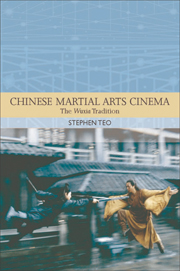Book contents
- Frontmatter
- Contents
- TRADITIONS IN WORLD CINEMA
- Acknowledgements
- Dedication
- Introduction
- 1 Wuxia from Literature to Cinema
- 2 Reactions against the Wuxia Genre
- 3 The Rise of Kung Fu, from Wong Fei-hung to Bruce Lee
- 4 The Rise of New School Wuxia
- 5 The Wuxia Films of King Hu
- 6 Wuxia after A Touch of Zen
- 7 Wuxia between Nationalism and Transnationalism
- Epilogue
- Glossary
- Bibliography
- Filmography
- Index
1 - Wuxia from Literature to Cinema
Published online by Cambridge University Press: 05 August 2013
- Frontmatter
- Contents
- TRADITIONS IN WORLD CINEMA
- Acknowledgements
- Dedication
- Introduction
- 1 Wuxia from Literature to Cinema
- 2 Reactions against the Wuxia Genre
- 3 The Rise of Kung Fu, from Wong Fei-hung to Bruce Lee
- 4 The Rise of New School Wuxia
- 5 The Wuxia Films of King Hu
- 6 Wuxia after A Touch of Zen
- 7 Wuxia between Nationalism and Transnationalism
- Epilogue
- Glossary
- Bibliography
- Filmography
- Index
Summary
This chapter recounts the literary antecedents of wuxia, examining the ideals and characteristics of Chinese knight-errantry as they have passed down through historical records and fiction, before proceeding to a review of the wuxia literature of the early twentieth century which directly preceded the cinematic genre and helped to bring about its birth. The cinema in turn has become a major historiographic apparatus of the wuxia genre, creating new filmic texts often to support and bolster the literary opuses on which directors and screenwriters had drawn. I explore the beginnings of the cinematic genre in the Shanghai film industry, tracing its growth through the early studio system of production and its culmination, four short years later, as the genre fell out of favour with intellectuals and the government, which then declared a ban on the genre.
Literary and Philosophical Traditions
The literary and philosophical antecedents from whence the character of xia was derived may be traced as far back as the Warring States period (403–221 bce) and perhaps as early as the Spring and Autumn period (722–481 bce). But it was not until the time of the Han dynasty (206 bce–220 ce) that a substantive history of the lives and traditions of xia was written. Sima Qian's Shi ji (Records of History), written between 104–91 bce during the reign of Han Wudi (the ‘Martial Emperor’) contains two chapters, ‘Biographies of Knights- Errant’ (‘Youxia liezhuan’), and ‘Biographies of the Assassins’ (‘Cike liezhuan’), which are usually cited as the historical records of remarkable personalities broadly described as xia and their feats of chivalry and loyalty in the Warring States and Qin periods.
- Type
- Chapter
- Information
- Chinese Martial Arts CinemaThe Wuxia Tradition, pp. 17 - 37Publisher: Edinburgh University PressPrint publication year: 2009



